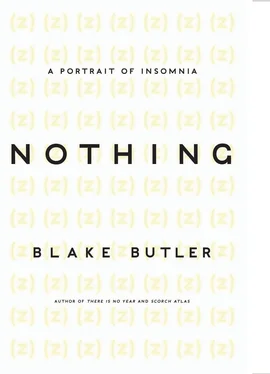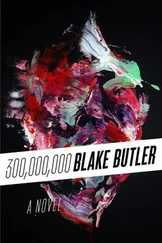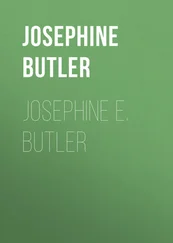If this all sounds ridiculous — this flopping, this awful waddle for what could be such a simple key — that’s because it is ridiculous — it’s self-created, really, though of a self not specifically the self — instead it is the self in congregation, the sets of sets of strands of images, ideas. It comes on from no center, in a chorus with no specific off-switch or delete. It is in the muddle of my blood — a blue lining in my body that cannot be shot or taught away, but simply slipped from, somehow. There are practices one might be suggested into — methods, medications, breathing, exercises, studies, more machines — which might work, but often too in overfocus can become part of the problem, in the mill.
It’s hardly helpful to hear science say I’m not alone. Sleep onset latency caused by “busy brain” is often named the most common form of insomnia complaint, if, among each person, a wholly different ream of concerns. From a study conducted in 1979, the year I was born:
(1) A.W. was a 37-year-old man suffering from very severe anxiety, referred for treatment of chronic guilt ruminations concerning both real events and unrealistic worries from his past life. He was constantly fearful of having given people “wrong information” and showed a variety of compulsive checking behaviors…
(2) B.E. was a 27-year-old man referred for treatment of ruminations about death, hell, evil and disease, and traumatic fantasies about a car accident he had witnessed 10 months previously. Anxiety-arousal included letterwriting without checking the envelopes for harmful material before sealing them, and writing literally damning phrases about the therapist (e.g. “go to Hell”).
(3) J.T. was a 40-year-old man who was obsessed with the need to verbalise covertly all the possible arguments for and against most of the decisions of his daily life. He had recorded many of these arguments on long rolls of paper lest he forget the exact words involved.58
Each of these three example patients was included in a thought-stopping study where they were taught methods for supplanting their anxiety thoughts with other thoughts and modes of relaxation. Of the three, results found no improvement in subject one and, in vast contrast, a marked improvement in subject two’s ability to control his thinking. The third “could not be contacted.” These widely scattered results demonstrate even more directly the wide and infinitely personalized effects and measures in one’s personal coping with sleep disruption, making the very manner of prescription, aid search, and so on more of a crapshoot, a waddling in the dark.
Though for some stretches I might find a long way out of this serial condition for weeks or months in passing — somehow slipped around the ledge into the lake of something if still not seamless, more at ease — it always seems at some point to return full bore within some stretch, as if at all times waiting just above me, falsely unprisoned — as if never fully gone.
]
]
]
In the documentary Derrida , Jacques Derrida talks very specifically about the extreme terror he sometimes feels in the half-sleep between waking and sleeping, a space wherein his mind questions the aggressive or “new” things he has written during that day, challenging them as inadmissible, horrendous, offensive, despite the fact that when he is writing them he feels confident, capable of all. He explains this odd duality by saying he believes he is actually less conscious during the creation period, more asleep, and it is only when he is half asleep, toward the exit, that his panic, fear — what he refers to herein as truth —is stoked, manifested, revealed, screaming, “Stop everything! Burn your papers!” Thus this between area seems more public than the creative shell, more vulnerable, if also somehow more strongly connected to waking contexts, as if the writing itself is where the author, in want of speaking from the unknown, the nowhere, is channeling the deeper state, the lock of sleep. The self, in becoming aware of the self overridden by existing half in one consciousness, half in the other, begins hates the self for what it does not know about its other — hates its production, fears the new. This kind of inverse relation, in my own body, often leaves me feeling as if I am more truly awake when I am asleep, and more asleep when I’m awake — opening the question of who in me or through me is doing the writing, and who in me or not in me is the one to which other people speak.
In a series of examinations of the brain’s processes of control, D. M. Wegner outlined a bimodal system that is activated in the governing of thinking.59 As a person comes across a thought he wishes to control, as those that distract one from clean sleep, the brain’s regular, active “operating” system (OS) becomes activated, to carry out the control. A second, effortless “monitoring” system (MS) runs in complement to the OS in search of cognitions to funnel toward, a system of inherent, readied distraction. For an average, daily person, this process for the most part goes on easily, without blip — the function carries out itself in silence, under flesh. In a body of above-average stress, though, the OS can become overloaded, flush, placing further strain upon the locomotion of the camouflage maneuver. As well, the new thought provided by the MS, when the OS is under strain, may add further noise into the system, coagulating as in a river’s mouth with leaves and logs. The spark of anxiety feeds its own hole — altering the usual process of distraction within one’s self to one of accrual, crudding up — allowing the system to become further damaged, fatter and fatter, toward a hyper, opaque state. Thus the sleep period becomes a paradox — a state you want so bad you cannot have it, the effort of solution refreshing the problem, again, again. Quickly, in this accrual, one can begin to feel more awake, in wanting sleeping, than one does at waking up. The day beginning as it ends, and therefore, in continuation, ending as it begins.
Proust, perhaps the most notorious of all writing-based nonsleepers, does well to illuminate this throng of awakening within and further in. “Such grave uncertainty, whenever the mind feels overtaken by itself; when it, the seeker, is also the obscure country where it must seek and where all baggage will be nothing to it.”60 Thus, the self is both the creator of its terrain, and the holosphere around it, the atlas not the sum of all its pages but an object, a clog of maps, which perhaps in certain configurations, and in trolling the relief points and deeper sinkings, the wormholes in the flattest face, that something still unnamable and nowhere can be if not centered, pulled to closer focus, grown as pressure in the chest, “face-to-face with something that does not yet exist… this unknown state which brought with it no logical proof, but only the evidence of its felicity, its reality, and in whose presence the other states of consciousness faded away.”61
At early or temporary periods of unsleeping it is this very clicking presence of dying time that keeps one going, ever-conscious of the counting-down clocks, the furor of the leak, but deeper in, as one resigns to scrying, it is the blank of time that feeds true heat — longer, wider, shapeless nothing — how knowing within in knowing that day and night time continues on and on, and that there in that is truer blank. “God channels this through me at night,” said Michael Jackson. “I can’t sleep because I’m so supercharged.” In the light, his waking body shifting beyond his control, photographed and malformed, filtered through recordings of his sound and bodies fainting as he walked into a room, which could be argued as a fuel for the spasms and gestures that comprised the dance-paroxysms that set him most distinctly in the flesh of his own flesh — looked at from afar in wonder, an entertainment, comprised of an unnameable fit-routine. “But the madness of an action was precisely determined by the fact that no reason could ever exhaust it,” writes Foucault. “The truth of madness was in an automatism that had no logic behind it, and the more an action was empty of reason, the greater the chances that it was solely the result of a determinism of madness, the truth of madness being in man the truth of all that was without reason, of all that resulted, as Pinel said, from ‘an unreflected determination, devoid of any concern for self-interest and any motivation.’ ”62 The self appearing in a blacking sphere around the brain, resigned to form the self again around the self again, of coagulating impetuses and blood tendencies and unconsciousness of pose. So that, with no point of cut out, no space or differentiating meat between kinds of minutes, a kind of borderline or wall of sorts thickens around the waking day and nodding night making each the same and that much more compressed into a faceless, flattened logic. Time for the unsleeper becomes one long going and going feed, wherein all is noise and light and all is sound, each welding to the self and turning the self outside the self at all. Even the dark at night becomes lit up; every silence screams.
Читать дальше












